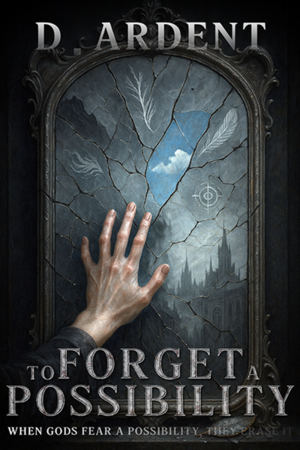Chapter 2:
Stone and Water
To Forget a Possibility
The words felt like dust in his mouth. Each recitation of the Twelve Verses of Salvation was a further betrayal of something he couldn’t quite grasp, a phantom limb aching for a past he couldn’t fully recall. “On the Beginning and the One Reflection…From the Reflection emerged Lyrrae, Lady of Mirrors, to bring order to the chaos…” The cadence was supposed to be soothing, a mantra to solidify faith, but to Elias, it felt like a cage being built around his mind, bar by meticulously crafted bar.
He stumbled over the fourth verse, the names of the Perturbations—Naraven, Vadra, Seraven, Mirai, Esera—sticking in his throat like shards of glass. Each syllable was a discordant note, striking a raw nerve within him. He hadn’t just forgotten the details, he’d forgotten the feeling associated with those names. A deep, visceral wrongness settled in his chest, a sense of a fundamental truth obscured. It wasn’t a rational disagreement with the teachings; it was a primal rejection, as if his very soul recoiled at their invocation.
He pressed the heels of his hands against his temples, trying to quell the rising tide of disorientation. The memory of a classroom—chalk dust motes dancing in sunbeams, the musty scent of old books, rows of expectant faces—flitted across his mind, vivid yet elusive. He’d stood at the front of that room, speaking with authority on complex historical events, shaping young minds. But which events? Which history? The details were fragmented, like a shattered mirror reflecting a distorted reality. The faces of his students blurred into an indistinguishable mass.
He took a shaky breath, fighting to anchor himself in the present, in this…alien reality. This wasn’t his body. The limbs felt too slender, too young, the skin too smooth. He glanced at his reflection in the polished surface of a nearby table. A boy stared back at him, with amber eyes that held a flicker of something ancient and weary. He barely recognized himself. It was a cruel mockery, a grotesque imitation of a life he couldn't quite remember.
The estate itself felt oppressive in its perfection. Everything was meticulously ordered, unnervingly symmetrical. Polished marble floors gleamed underfoot, reflecting the ornate chandeliers like distorted pools of light. Mirrors adorned every wall, amplifying the sense of confinement, of being constantly observed. It wasn't merely beautiful; it was suffocating. A gilded cage built on illusion. The very air seemed heavy with the scent of incense and a subtle, cloying sweetness that clung to the back of his throat.
He attempted to recall the details of his “recovery,” the story he was expected to tell. A wasting illness, a near-death experience, a miraculous intervention by the Goddess. It was a narrative designed to reinforce faith, to demonstrate Lyrrae’s benevolence. But the details felt…fabricated. Hollow. He had no memory of being ill, no recollection of a divine rescue. Just the jarring sensation of waking up in this strange body, surrounded by weeping mourners praising a goddess he didn’t know.
He ran a hand through his auburn hair– a color he didn't remember having. He felt a growing frustration, a desperate urge to unravel the truth. But how? Where to even begin when his own memories were so fragmented, so unreliable?
A soft knock at the door startled him, interrupting his tortured reverie.
“Elias, dear?” Helena’s voice, gentle and laced with worry, drifted through the wood.
He straightened his posture, attempting to compose himself. "Come in, Mother.”
Helena entered, a tray laden with honey cakes and a steaming pot of spiced tea. Her face was etched with a familiar concern, her eyes brimming with a maternal warmth that felt both comforting and unsettling.
“You’ve been at it for a while, darling,” she said, her voice soft as a summer breeze. “You must be exhausted. You need to keep your strength up. The Festival is only a few days away now.” She fussed with the arrangement of the pastries, carefully placing one closer to his hand. “Matthias says you’re looking much better. A miracle, truly. The Goddess has blessed us.”
He managed a weak smile in return, accepting a honey cake. It was light and fluffy, drizzled with a fragrant syrup, but the sweetness did little to dispel the bitterness in his mouth. He took a small bite, barely tasting it.
“Just…practicing, Mother,” he managed to say, the word feeling alien on his tongue. “Ensuring I remember everything for the Festival.”
Helena beamed, her eyes crinkling at the corners. “That’s my good boy. Such a devout young man. You’ve always had a good heart, Elias. The Goddess smiles upon you, you must never forget that.” She reached out and gently smoothed a stray strand of hair from his forehead, her touch lingering for a moment.
He forced another smile, meeting her gaze. It was meant to be reassuring, but he couldn't shake the feeling of disconnect. She wasn't seeing him—the man who once stood before a classroom full of eager students, the man who remembered a vastly different world. She was seeing the ideal she wanted him to be, the pious, grateful son who had been miraculously spared.
“Is everything alright, Elias?” she asked, her voice laced with concern. “You seem…distant.”
“Just tired, Mother,” he replied quickly, forcing a lightness into his tone. “Rehearsing the verses is rather…taxing.”
Helena’s expression softened. “Of course, dear. You must rest. I’ll ask the servants to prepare a warm bath for you. And perhaps a soothing balm for your temples. You’ve been through so much.”
He nodded gratefully as she continued to fuss over him, rearranging the pillows on the nearby chaise lounge and adjusting the curtains to filter the sunlight. It was a kindness, undeniably, yet it felt like a suffocating blanket, smothering the last embers of his own identity. He felt like a puppet, painstakingly dressed and posed for a performance he didn’t understand, and for an audience he couldn’t quite place. The dissonance continued to build, a slow, insidious ache that threatened to overwhelm him. He was trapped, caught between two worlds, two lives, two realities that refused to reconcile. And the weight of the lie was becoming almost unbearable.
The lingering scent of spiced tea and honey offered little solace. He needed fresh air, space to think. He excused himself from Helena’s solicitous care, murmuring something about needing to review the Festival arrangements, and slipped out of the room, seeking refuge in the estate’s formal gardens. The sculpted hedges and meticulously arranged flowerbeds felt less oppressive than the ornate interiors, but even here, a sense of watchful order permeated the atmosphere.
He barely had time to draw a deep breath before the atmosphere shifted once more. A subtle change in the light, a tightening of the air, a hush that fell over the garden’s usual symphony of birdsong. He knew, instinctively, that he was no longer alone.
A moment later, High Inquisitor Veyla emerged from the shaded path, accompanied by two silent acolytes clad in the stark white robes of the Temple. Her presence was commanding, radiating an aura of unwavering authority and unsettling calm. She moved with a deliberate grace, her gaze sweeping over the garden—and over him—with an intensity that made his skin prickle.
Veyla was a study in sharp angles and controlled composure. Her face was pale and unyielding, framed by a severe, dark hairstyle. Her eyes, the color of chipped flint, seemed to dissect him, to assess his every gesture, every flinch. She carried herself with an air of divine purpose, as if she were an instrument of the Goddess’s will, tasked with ensuring the purity of the realm.
“Young Elias,” Veyla said, her voice smooth as polished stone, but lacking any warmth. “The Goddess has bestowed upon you a great blessing, a testament to her infinite mercy. It is the Temple’s duty to ensure that you are…prepared to receive this gift with the reverence it deserves.”
He forced himself to meet her gaze, attempting to project an air of calm he didn’t feel. “I…I am grateful for the Goddess’s grace, Inquisitor Veyla,” he stammered, the words feeling strangely hollow on his tongue.
“Gratitude is a noble sentiment,” Veyla replied, her lips curving into a faint, almost dismissive smile. “However, true faith requires more than mere words. It demands a complete and unwavering devotion, a willingness to surrender oneself fully to the divine will.”
She paused, her gaze lingering on his face. "We are gracious for your rapid recovery, of course. A miraculous intervention, truly. But it is the Temple’s responsibility to verify such accounts, to ensure that there are no…unforeseen complications.”
He knew what she meant. They doubted him. They suspected him of harboring some hidden darkness, some unconfessed impurity. The thought sent a shiver of dread down his spine. He was a stranger in this world, a fragile anomaly surrounded by a sea of unwavering faith.
“This is Sister Liora Velshan,” Veyla continued, gesturing to the woman who had been standing silently beside her. “She will remain at the estate, providing guidance and answering any questions you may have regarding the sacred texts.” It was a clear message: he was being watched. He was a subject of scrutiny, not a recipient of grace.
Liora stepped forward, offering a hesitant smile. Her expression was neutral, her features carefully composed. But her gaze, unlike Veyla’s, held a flicker of something else—a subtle curiosity, perhaps, or a hint of cautious sympathy. She didn't seem quite as…impenetrable as Veyla.
“We trust you will cooperate fully, Elias,” Veyla said, her voice leaving no room for argument. “The Temple’s guidance is a gift, a pathway to enlightenment. Embrace it, and you will find peace.”
Before he could respond, Veyla turned and began to walk back toward the estate, her acolytes flanking her like silent sentinels. She paused briefly, glancing back at him over her shoulder.
“Remember, Elias,” she said, her voice chillingly soft. “The Goddess sees all. And she judges accordingly.”
With that, she was gone, leaving him standing alone in the meticulously ordered garden, feeling exposed and vulnerable.
Helena hurried out of the house, her face flushed with excitement. “Oh, Sister Liora! I’m so glad you’re here! Please, come with me, I insist. Let me show you to the guest room. It’s not grand, but it’s comfortable. I’ve had it prepared with fresh flowers and a selection of our finest teas.”
Liora offered a polite smile, her eyes briefly meeting his before she allowed Helena to lead her away. As they walked toward the house, Elias couldn't shake the feeling that he was being drawn into a web of intricate control, a labyrinth of faith and suspicion from which there might be no escape. And he had a growing, unsettling suspicion that Sister Liora, with her hesitant smile and curious gaze, was not merely a benevolent guide, but a silent observer, a watchful guardian of the Temple’s secrets. The weight of the lie, the pressure to conform, felt heavier than ever. He felt utterly alone.
The polite but insistent chatter of Helena and Liora faded as he retreated, seeking refuge once more within the hushed confines of the estate’s library. He offered a mumbled excuse about needing to review the Festival’s ceremonial procedures, a fabrication that felt flimsy even to his own ears. Helena, ever solicitous, simply offered a reassuring smile and waved him on, her attention already fully consumed by entertaining Liora.
The library was a sanctuary of sorts, a dimly lit space filled with the scent of aged parchment and binding glue. Unlike the polished perfection of the rest of the estate, there was a comforting disarray to the bookshelves, a sense of accumulated knowledge and quiet contemplation. He hadn’t consciously sought it out, but his feet had carried him here almost instinctively, drawn by a faint, half-forgotten longing for the intellectual solace he had once known.
Even before the accident, even before the fractured memories and the stolen life, books had been his anchors. They had been his companions, his teachers, his windows onto the world. He’d spent countless hours immersed in their pages, tracing the contours of history, unraveling the mysteries of the past. The thought brought a pang of sadness, a wistful ache for a life he could no longer fully recall.
He wandered through the rows, running his fingertips along the spines, searching for something—anything— that might trigger a forgotten memory, a flicker of recognition. The titles were predominantly religious texts, carefully curated histories of Lyrrae’s ascension, and devotional treatises on the virtues of faith and obedience. There was a distinct lack of dissenting voices, a conspicuous absence of alternative perspectives. The library, he realized, wasn’t a repository of knowledge; it was a carefully constructed echo chamber, designed to reinforce the dominant ideology.
He paused before a section dedicated to the “Five Perturbations,” the ancient entities that Lyrrae had supposedly vanquished. The books were filled with grotesque illustrations depicting the demons as monstrous caricatures—Naraven as a towering stone giant, Vadra as a serpentine sea creature, Seraven as a shadowy figure shrouded in illusion, Mirai as a heartless weaver of webs, and Esera as a decaying specter of death. It was persuasion, plain and obvious, designed to instill fear and reinforce the Goddess’s authority.
And yet, even in those distorted depictions, he sensed a dissonance. A nagging feeling that the truth was far more complex, far more nuanced.
He continued his search, his gaze sweeping across the shelves, until he noticed a slight irregularity. A section of the paneling behind a row of particularly large volumes seemed to be slightly askew. Driven by a sudden impulse, he reached out and pressed against the wood.
With a soft click, a section of the wall slid open, revealing a hidden alcove. The space was small and concealed, barely large enough to accommodate a single person. Inside, resting on a faded velvet cushion, lay a small, leather-bound volume.
It was unlike any book he had seen in the rest of the library. The leather was worn and cracked, the pages brittle and yellowed with age. The binding was unadorned, lacking the ornate embellishments that characterized the other books in the estate.
He carefully lifted the volume, his heart quickening with a mix of anticipation and trepidation. It felt…different. It felt real.
He carefully unfolded the volume, his fingertips brushing across the fragile pages. The script was elegant, almost lyrical, but archaic, a dialect he vaguely recognized but couldn’t quite place. The pages were filled with fragments of poems, forgotten stories, and cryptic verses, hinting at a time before Lyrrae’s dominance, a time when other gods were worshipped, when other beliefs held sway. He recognized a recurring motif— depictions of flowing water, twisting vines, and ancient stones that seemed to pulse with an inner light.
His gaze fell upon a single line, penned in faded ink, that sent a shiver down his spine:
“Where stone remembers, and the current carries all away.”
He read the line again and again, the words resonating within him with an unsettling familiarity. He didn’t understand its meaning, not consciously, but it stirred something deep within him, a primal recognition of a truth long forgotten. It wasn't an intellectual understanding, but a visceral reaction, a sudden, intuitive grasp of a profound connection.
A fragmented image flashed through his mind—a crumbling temple, half-submerged in water, ancient carvings depicting figures with elongated limbs and haunting eyes. He grasped at the memory, trying to hold onto it, but it slipped through his fingers like sand.
He closed the book, his hands trembling slightly. The weight of it felt significant, a tangible link to a past he couldn’t quite access. He carefully hid the volume within his chambers, tucking it away beneath a loose floorboard in the corner of the room.
He glanced out the window, at the fractured moon hanging in the ashy sky. The weight of the lie, the pressure to conform, felt heavier than ever. This book, this hidden fragment of the past, was a spark of hope, a potential key to unlocking the mysteries of this world.
But he knew, with a growing sense of dread, that he had stumbled upon something dangerous. And he had a feeling that he wasn't the only one who knew about the book’s existence. The air felt thick with unspoken secrets, and he couldn't shake the feeling that he was being watched, even in the solitude of the library. The stones of the estate, he sensed, remembered far more than anyone realized. And the current, he suspected, was about to carry him away into uncharted waters.




Please sign in to leave a comment.